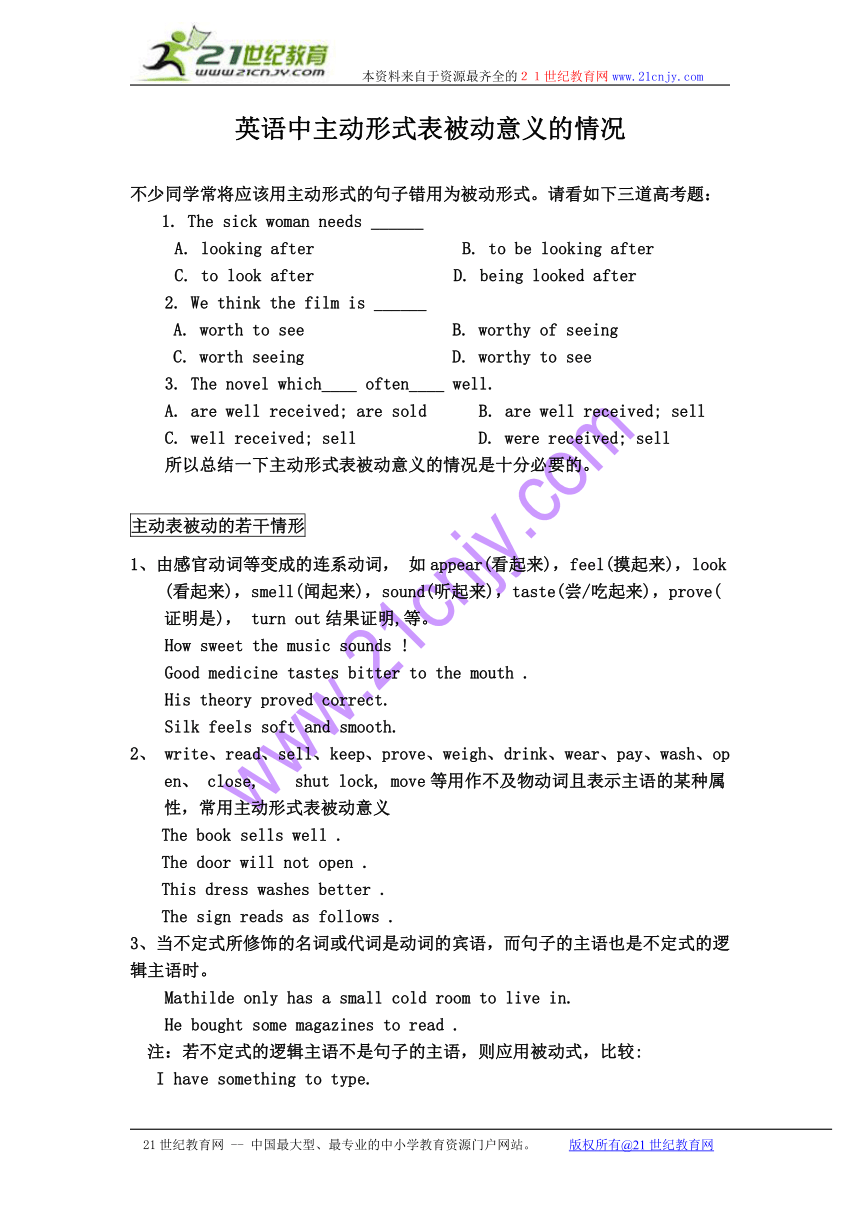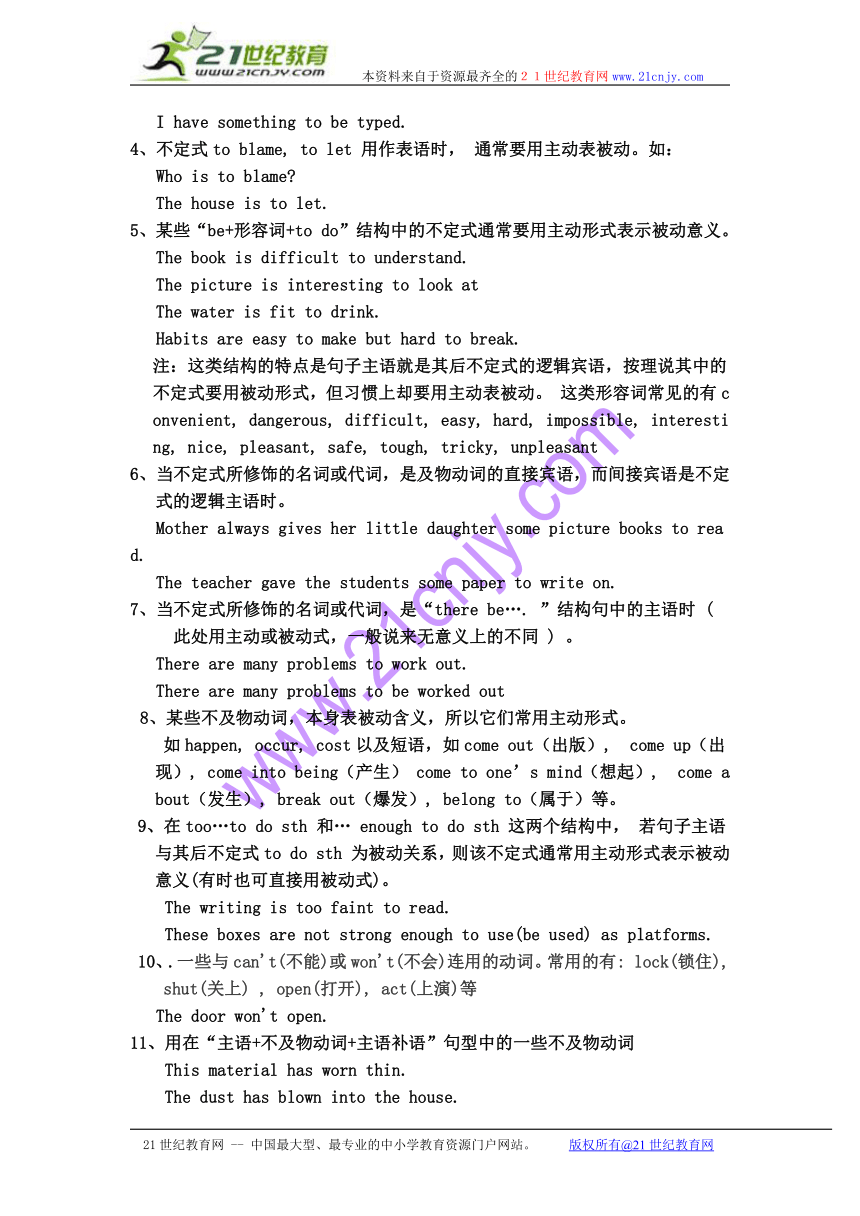英语中主动形式表被动意义的情况
图片预览


文档简介
本资料来自于资源最齐全的21世纪教育网www.21cnjy.com
英语中主动形式表被动意义的情况
不少同学常将应该用主动形式的句子错用为被动形式。请看如下三道高考题:
1. The sick woman needs ______
A. looking after B. to be looking after
C. to look after D. being looked after
2. We think the film is ______
A. worth to see B. worthy of seeing
C. worth seeing D. worthy to see
3. The novel which____ often____ well.
A. are well received; are sold B. are well received; sell
C. well received; sell D. were received; sell
所以总结一下主动形式表被动意义的情况是十分必要的。
主动表被动的若干情形
1、由感官动词等变成的连系动词, 如appear(看起来),feel(摸起来),look(看起来),smell(闻起来),sound(听起来),taste(尝/吃起来),prove( 证明是), turn out结果证明,等。
How sweet the music sounds !
Good medicine tastes bitter to the mouth .
His theory proved correct.
Silk feels soft and smooth.
2、 write、read、sell、keep、prove、weigh、drink、wear、pay、wash、open、 close, shut lock, move等用作不及物动词且表示主语的某种属性,常用主动形式表被动意义
The book sells well .
The door will not open .
This dress washes better .
The sign reads as follows .
3、当不定式所修饰的名词或代词是动词的宾语,而句子的主语也是不定式的逻辑主语时。
Mathilde only has a small cold room to live in.
He bought some magazines to read .
注:若不定式的逻辑主语不是句子的主语,则应用被动式,比较:
I have something to type.
I have something to be typed.
4、不定式to blame, to let 用作表语时, 通常要用主动表被动。如:
Who is to blame
The house is to let.
5、某些“be+形容词+to do”结构中的不定式通常要用主动形式表示被动意义。
The book is difficult to understand.
The picture is interesting to look at
The water is fit to drink.
Habits are easy to make but hard to break.
注:这类结构的特点是句子主语就是其后不定式的逻辑宾语,按理说其中的不定式要用被动形式,但习惯上却要用主动表被动。 这类形容词常见的有convenient, dangerous, difficult, easy, hard, impossible, interesting, nice, pleasant, safe, tough, tricky, unpleasant
6、当不定式所修饰的名词或代词,是及物动词的直接宾语,而间接宾语是不定式的逻辑主语时。
Mother always gives her little daughter some picture books to read.
The teacher gave the students some paper to write on.
7、当不定式所修饰的名词或代词,是“there be…. ”结构句中的主语时 ( 此处用主动或被动式,一般说来无意义上的不同 ) 。
There are many problems to work out.
There are many problems to be worked out
8、某些不及物动词,本身表被动含义,所以它们常用主动形式。
如happen, occur, cost以及短语,如come out(出版), come up(出现), come into being(产生) come to one’s mind(想起), come about(发生), break out(爆发), belong to(属于)等。
9、在too…to do sth 和… enough to do sth 这两个结构中, 若句子主语与其后不定式to do sth 为被动关系,则该不定式通常用主动形式表示被动意义(有时也可直接用被动式)。
The writing is too faint to read.
These boxes are not strong enough to use(be used) as platforms.
10、.一些与can't(不能)或won't(不会)连用的动词。常用的有: lock(锁住), shut(关上) , open(打开), act(上演)等
The door won't open.
11、用在“主语+不及物动词+主语补语”句型中的一些不及物动词?
This material has worn thin.?
The dust has blown into the house.?
12、在动词want、need、require等后面常用动名词表示被动含义,等于不定式的被动形式。
The bike needs (wants) repairing (= ____________ ) .
13、worth后跟动名词主动形式表示被动,但是不跟不定式的被动。
This novel is well worth reading。
14、介词形式,被动意义
This new railway is still under construction .
本句中的under construction “正在建设中”。介词under构成的短语,如果它的宾语是表示动作的名词,通常含有被动意义,意为“在……过程中”。它可改换为被动语态。但介词结构使句子言简意赅,避免过多地使用被动语态。这种介词短语在句中常作表语,也可作补足语或定语。例如:
Your suggestion is still under discussion .
He is said to be under arrest for stealing .
The house under repair is our classroom building .
常见的这类under短语还有:
under attack under investigation
under arrest under the leadership
under consideration under treatment
under construction under trial
under contact under repair
under discussion under review
under examination
还有一些介词,如in , on , for , above , beyond , past , out of , within等,也可以构成表示动作的介词短语。如:
The writer has finished writing his novel but it is not yet in print.
(= …being printed)
Grapes from XinJiang are on sale.(=…to be _____)
His virtue is above all praise. (=…can’t be _______ completely)
His car was out of control.(=…could not be ________)
The pain was almost past bearing. (=…couldn’t be ______)
The city is already within sight.(=…can be ________ already)
巩固练习:
一、翻译下列句子
1. 这笔很好写。
2. 这本小说不好译。
3. 八点钟开始上课。
4. 这部电影值得看。
5. 我有话要说。
6. 这项工作很容易做。
7. 你说的话证明是错的。
8. 他借来一些杂志来阅读。
二、选择最佳答案
1.Great changes ____ in my hometown, and a lot of factories____.
A. has taken place; are being set up.
B. have taken place; have been set up
C. are taken place; had been set up
D. took place; will be set up
2. By the time the war____, most of the people had left.
A. was began B. was broken out C. broke out D. had been broken out
3. The Anti-Japanese War ____ in 1937 and it ____ eight years.
A. was broken out; lasted B. broke out; lasted
C. break out; lasts D. broke out; last
4. The new dictionaries are very useful. They ____ well and ____ already.
A. sold; have been sold out B. sold; had sold out
C. sell; sell out D. are sold; have been sold out
5. The new school has been completed. It____ very beautiful.
A. is looked B. looked C. has looked D. looks
6. The things talked about in their report____ over a year ago.
A. had taken place B. took place
C. was taken place D. have taken place
7. The evening news comes on at seven o’clock and _______ only thirty minutes.
??A. keeps??B. continues??C. finishes??D. lasts
??8. ——— Mummy, can I put the peaches in the cupboard
??——— No, dear. They don’t ____ well. Put them in the fridge instead.
??A. keep??B. fit??C. get??D. last
??9. Books of this kind _________ well.
??A. sell??B. sells??C. are sold??D .is sold
10. The computers on the table ___ Professor Smith.
A. belongs B. are belonged to C. belongs to D. belong to
11. Take care! Don’t drop the ink on your shirt, for it __ easily.
A. won’t wash out B. won’t be washed out
C.isn’t washed out D. isn’t washing out
12. I have no more letters ____ ,thank you.
A. to type B. typing C. to be typed D. typed
13. It is difficult for a foreigner ____ Chinese.
A. write B. to write C. to be written D. written
14. --- Do you like the material
--- Yes, it ___ very soft.
A. is feeling B. felt C. feels D. is felt
15. That suit __ over 60 dollars.
A. had costed B. costed C. is costed D. cost
16. I have no idea what _______ while I was asleep.
A. has happened B. was happened C. had happened D. happened
参考答案:
1. The pen writes well.
2. The novel doesn’t translate easily.
3. Class begins at 8.00.
4. The movie is worth seeing.
5. I have something to say.
6. The job is easy to do.
7. What you said proved to be wrong.
8. He borrowed some magazines to read.
二.1-5 BCBAD 6-10 BDAAD 11-16 ACBCDD
21世纪教育网 -- 中国最大型、最专业的中小学教育资源门户网站。 版权所有@21世纪教育网
英语中主动形式表被动意义的情况
不少同学常将应该用主动形式的句子错用为被动形式。请看如下三道高考题:
1. The sick woman needs ______
A. looking after B. to be looking after
C. to look after D. being looked after
2. We think the film is ______
A. worth to see B. worthy of seeing
C. worth seeing D. worthy to see
3. The novel which____ often____ well.
A. are well received; are sold B. are well received; sell
C. well received; sell D. were received; sell
所以总结一下主动形式表被动意义的情况是十分必要的。
主动表被动的若干情形
1、由感官动词等变成的连系动词, 如appear(看起来),feel(摸起来),look(看起来),smell(闻起来),sound(听起来),taste(尝/吃起来),prove( 证明是), turn out结果证明,等。
How sweet the music sounds !
Good medicine tastes bitter to the mouth .
His theory proved correct.
Silk feels soft and smooth.
2、 write、read、sell、keep、prove、weigh、drink、wear、pay、wash、open、 close, shut lock, move等用作不及物动词且表示主语的某种属性,常用主动形式表被动意义
The book sells well .
The door will not open .
This dress washes better .
The sign reads as follows .
3、当不定式所修饰的名词或代词是动词的宾语,而句子的主语也是不定式的逻辑主语时。
Mathilde only has a small cold room to live in.
He bought some magazines to read .
注:若不定式的逻辑主语不是句子的主语,则应用被动式,比较:
I have something to type.
I have something to be typed.
4、不定式to blame, to let 用作表语时, 通常要用主动表被动。如:
Who is to blame
The house is to let.
5、某些“be+形容词+to do”结构中的不定式通常要用主动形式表示被动意义。
The book is difficult to understand.
The picture is interesting to look at
The water is fit to drink.
Habits are easy to make but hard to break.
注:这类结构的特点是句子主语就是其后不定式的逻辑宾语,按理说其中的不定式要用被动形式,但习惯上却要用主动表被动。 这类形容词常见的有convenient, dangerous, difficult, easy, hard, impossible, interesting, nice, pleasant, safe, tough, tricky, unpleasant
6、当不定式所修饰的名词或代词,是及物动词的直接宾语,而间接宾语是不定式的逻辑主语时。
Mother always gives her little daughter some picture books to read.
The teacher gave the students some paper to write on.
7、当不定式所修饰的名词或代词,是“there be…. ”结构句中的主语时 ( 此处用主动或被动式,一般说来无意义上的不同 ) 。
There are many problems to work out.
There are many problems to be worked out
8、某些不及物动词,本身表被动含义,所以它们常用主动形式。
如happen, occur, cost以及短语,如come out(出版), come up(出现), come into being(产生) come to one’s mind(想起), come about(发生), break out(爆发), belong to(属于)等。
9、在too…to do sth 和… enough to do sth 这两个结构中, 若句子主语与其后不定式to do sth 为被动关系,则该不定式通常用主动形式表示被动意义(有时也可直接用被动式)。
The writing is too faint to read.
These boxes are not strong enough to use(be used) as platforms.
10、.一些与can't(不能)或won't(不会)连用的动词。常用的有: lock(锁住), shut(关上) , open(打开), act(上演)等
The door won't open.
11、用在“主语+不及物动词+主语补语”句型中的一些不及物动词?
This material has worn thin.?
The dust has blown into the house.?
12、在动词want、need、require等后面常用动名词表示被动含义,等于不定式的被动形式。
The bike needs (wants) repairing (= ____________ ) .
13、worth后跟动名词主动形式表示被动,但是不跟不定式的被动。
This novel is well worth reading。
14、介词形式,被动意义
This new railway is still under construction .
本句中的under construction “正在建设中”。介词under构成的短语,如果它的宾语是表示动作的名词,通常含有被动意义,意为“在……过程中”。它可改换为被动语态。但介词结构使句子言简意赅,避免过多地使用被动语态。这种介词短语在句中常作表语,也可作补足语或定语。例如:
Your suggestion is still under discussion .
He is said to be under arrest for stealing .
The house under repair is our classroom building .
常见的这类under短语还有:
under attack under investigation
under arrest under the leadership
under consideration under treatment
under construction under trial
under contact under repair
under discussion under review
under examination
还有一些介词,如in , on , for , above , beyond , past , out of , within等,也可以构成表示动作的介词短语。如:
The writer has finished writing his novel but it is not yet in print.
(= …being printed)
Grapes from XinJiang are on sale.(=…to be _____)
His virtue is above all praise. (=…can’t be _______ completely)
His car was out of control.(=…could not be ________)
The pain was almost past bearing. (=…couldn’t be ______)
The city is already within sight.(=…can be ________ already)
巩固练习:
一、翻译下列句子
1. 这笔很好写。
2. 这本小说不好译。
3. 八点钟开始上课。
4. 这部电影值得看。
5. 我有话要说。
6. 这项工作很容易做。
7. 你说的话证明是错的。
8. 他借来一些杂志来阅读。
二、选择最佳答案
1.Great changes ____ in my hometown, and a lot of factories____.
A. has taken place; are being set up.
B. have taken place; have been set up
C. are taken place; had been set up
D. took place; will be set up
2. By the time the war____, most of the people had left.
A. was began B. was broken out C. broke out D. had been broken out
3. The Anti-Japanese War ____ in 1937 and it ____ eight years.
A. was broken out; lasted B. broke out; lasted
C. break out; lasts D. broke out; last
4. The new dictionaries are very useful. They ____ well and ____ already.
A. sold; have been sold out B. sold; had sold out
C. sell; sell out D. are sold; have been sold out
5. The new school has been completed. It____ very beautiful.
A. is looked B. looked C. has looked D. looks
6. The things talked about in their report____ over a year ago.
A. had taken place B. took place
C. was taken place D. have taken place
7. The evening news comes on at seven o’clock and _______ only thirty minutes.
??A. keeps??B. continues??C. finishes??D. lasts
??8. ——— Mummy, can I put the peaches in the cupboard
??——— No, dear. They don’t ____ well. Put them in the fridge instead.
??A. keep??B. fit??C. get??D. last
??9. Books of this kind _________ well.
??A. sell??B. sells??C. are sold??D .is sold
10. The computers on the table ___ Professor Smith.
A. belongs B. are belonged to C. belongs to D. belong to
11. Take care! Don’t drop the ink on your shirt, for it __ easily.
A. won’t wash out B. won’t be washed out
C.isn’t washed out D. isn’t washing out
12. I have no more letters ____ ,thank you.
A. to type B. typing C. to be typed D. typed
13. It is difficult for a foreigner ____ Chinese.
A. write B. to write C. to be written D. written
14. --- Do you like the material
--- Yes, it ___ very soft.
A. is feeling B. felt C. feels D. is felt
15. That suit __ over 60 dollars.
A. had costed B. costed C. is costed D. cost
16. I have no idea what _______ while I was asleep.
A. has happened B. was happened C. had happened D. happened
参考答案:
1. The pen writes well.
2. The novel doesn’t translate easily.
3. Class begins at 8.00.
4. The movie is worth seeing.
5. I have something to say.
6. The job is easy to do.
7. What you said proved to be wrong.
8. He borrowed some magazines to read.
二.1-5 BCBAD 6-10 BDAAD 11-16 ACBCDD
21世纪教育网 -- 中国最大型、最专业的中小学教育资源门户网站。 版权所有@21世纪教育网
